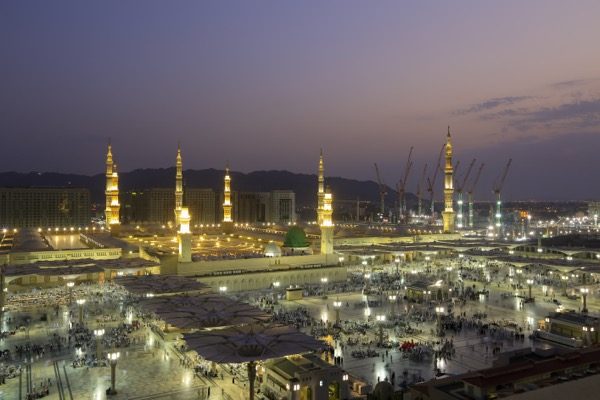
For a long time, we as a Community (the Ahmadiyya Muslim Community), have warned others about the corrupt and criminal ideology that is taught in the so-called colleges of Islamic Shariah law, an ideology which is also disseminated through religious lectures and Friday sermons.
These Mullahs – or religious leaders, are in actuality teaching their followers and students, fictitious Islamic tenets, which are completely contradictory to the teachings of the Holy Qur’an. As an example, they are endorsing the gathering of infidel captives and the killing of prisoners whilst the Holy Qur’an clearly states:
“It does not behove a Prophet that he should have captives until he engages in regular fighting in the land. You desire the goods of the world, while Allah desires for you the Hereafter. And Allah is Mighty, Wise.”[1]
This Qur’anic statement illustrates that Islam does not teach the seizing of captives unless engaging in direct warfare. Furthermore, Islam has forbidden the kidnapping of members of hostile tribes, which was a practice that was prevalent prior to Islam.
Moreover, the Holy Qur’an has also put forth rules for the release of prisoners as it states:
“…then afterwards either release them as a favour or by taking ransom — until the war lays down its burdens.”[2]
Yet, contrary to the clear Qur’anic teachings above, ISIS ‘scholars’ teach their followers to capture infidel women. For example, one of them has written: “Evidence of the permissibility of capturing infidel women are more than what we can encompass, but we divide them into two sections: general evidence, and special evidence. The general evidence is that the honour of the Muslims is sacred, while it is allowed to violate the honour of the unbelievers, except if they believe or ask for security.”[3]
In addition, extremists are now teaching that an aggressive Jihad is permissible. They are following the ideology of Ibn Baaz, who was the Grand Mufti of Saudi Arabia between 1993-1999, who stated that the Qur’anic statement, “‘There is no compulsion in religion’[4] was only valid before the time that Allah the Almighty permitted Jihad by the sword against all infidels!”[5] This suggests that the verse “There is no compulsion in religion,”[6] was revealed only for the period when the Muslims were weak and vulnerable. Thus, misguided Muslim leaders and extremists are suggesting that this verse is deceptive or at best obsolete. They completely disregard the definitive words of God Almighty in Surah Al-Kahf (a chapter of the Holy Qur’an) when He declares: “…wherefore let him who will, believe, and let him who will, disbelieve.”[7] It is clear from this verse that it is always wrong to force others to Islam—this injunction was for all time.
Furthermore, God Almighty clearly told the Holy Prophet Muhammadsa the parameters of his advent, “Admonish, therefore, for thou art but an admonisher; Thou hast no authority to compel them.”[8] Again, this shows that the writings of ISIS have no basis in Islam or the Holy Qur’an.
Extremists are also teaching their followers that the one who curses the Holy Prophetsa should be killed! Yet, there is not a single verse in the Holy Qur’an declaring that ridicule or blasphemy is a crime punishable by man. In fact, the exact opposite is true; there are five Qur’anic verses which address the subject of disbelievers’ mockery, and none of them mention that any punitive action may be taken. God Almighty has declared that He Himself shall exact all punishments in due course,
“And He has already revealed to you in the Book that, when you hear the Signs of Allah being denied and mocked at, sit not with them until they engage in a talk other than that; for in that case you would be like them. Surely, Allah will assemble the hypocrites and the disbelievers in Hell, all together.”[9]
Nothing is mentioned here about punishing blasphemy with death.
In addition to their misguided conceptions of Jihad, they are also wrong about the implementation of Jiziyah (tax collected from the defeated people who believe in imposing it on their enemies as retaliatory action). These misguided mullahs and extremists are teaching that Jiziyah is imposed on “the people of the Book” (the Qur’anic term for Jews and Christians), regardless of whether they are warriors or not. Ibn Baaz, who issued fatwas (religious edicts) for the Government of Saudia Arabia, claimed that the Qur’anic statement that there is no compulsion in religion was only relevant before God permitted Jihad of the sword against infidels, except those among “the People of the Book” who paid Jiziyah. He argued that Allah the Almighty exempted the people of the book from being fought by Muslims if they paid the Jiziyah and acknowledged their subjection. He argued that the duty of Muslims was to compel infidels to embrace Islam, except those among these mentioned groups who paid Jiziyah. By compelling them to pay Jiziyah, they had already been humiliated and subdued.[10]
He also said, “We have been told how the Messenger of Allah – peace be upon him – and the caliphs after him dealt with the Arabs who were idolaters and others who were not the People of the Book. They were given the ultimatum to either embrace Islam or be killed.”
He is not the only one to hold these views: Ibn Jarir al-Tabari, a prominent and influential Persian scholar, historian and exegete of the Qur’an, also said:
“It is unanimously agreed that the Messenger of Allah – peace be upon him – refused to take Jiziyah from the idolaters of the Arabs, he did not accept anything from them except Islam or the sword.”[11]
In addition, Ibn Hazm, an Andalusian polymath born in Cordoba, present-day Spain, said: “Muslims did not differ in that the Messenger of Allahsa did not accept anything from the Arab pagans except their acceptance of Islam or the sword, until he died, so that there is a compulsion in religion.”[12]
The above Islamic writers and extremist groups then justified this force in Islam by quoting the Qur’anic verses which permitted fighting the aggressors, wrongly interpreting them to be permission to fight all disbelievers, except those Jews and Christians who accepted paying Jiziyah.
It was these same corrupt leaders who then taught their followers to kill apostates, arguing, “There is a consensus that apostates from Islam should be killed.” “They differed only in Istitabah (asking the apostate to repent), and from whom such individuals could beseech repentance. Among the most famous acts of the Companions – May Allah be pleased with them – after the death of the Prophetsa are the wars of the apostates, which were mentioned in the Qur’anic verse – as told by many commentators, ‘You shall be called to fight against a people of mighty valour; you shall fight them until they surrender[13].’”[14]
 But the truth is that this verse is not related at all to their aggression; rather, it concerns fighting the Persians and Roman aggressors, and predicts that fighting will continue until they surrender. This verse is in the context of exhorting the hypocrites to fight in defence of religion, not for a desire for this world, and that they should not fear as they did in the past.
But the truth is that this verse is not related at all to their aggression; rather, it concerns fighting the Persians and Roman aggressors, and predicts that fighting will continue until they surrender. This verse is in the context of exhorting the hypocrites to fight in defence of religion, not for a desire for this world, and that they should not fear as they did in the past.
Extremists are also teaching their followers the doctrine of al-walaa and al-baraa (loyalty to loving the believers and dissociate from the non-believers in religious matters). They argue that al-walaa is the love and closeness to the believers, whereas al-baraa is hating and disowning the disbelievers and their religion. But it is clear that this is wrong. Allah the Almighty says, “Allah forbids you not, respecting those who have not fought against you on account of your religion, and who have not driven you forth from your homes, that you be kind to them and act equitably towards them; surely Allah loves those who are equitable.”[15] So it is not an issue of love and hatred, it is loyalty and dissociation in religious issues only.
Extremists are also teaching their followers to prevent non-Muslims from building their temples and places of worship. They argue that one of the requirements of the faith is to prohibit blasphemy, which requires the prohibition of worshipping Allah in a contrary way to what Islam endorses. Thus, they argue it is permissible to prohibit the building of synagogues and churches as they belong to the abrogated religions of the Jewish and Christian faiths.[16]
For example, they write: “Allowing building the blasphemous temples such as churches, or allocating a place for them in any Islamic country is supporting blasphemy and an encouragement of its doctrines...” Taqi ad-Din Ahmad ibn Taymiyyah Shaykh al-Islam, an Islamic scholar, theologian and logician, said “The one who thinks that churches are houses of God, and that God is being worshipped there, or that what Jews and Christians do is a worship of God and obedience to His Messenger, or that it is pleasing Him, or if he helps them to open their place of worship and establish their religion, thinking that this act is an obedience to Allah, is an infidel.”[17]
Furthermore, they teach their followers to hate the non-believers, and whoever does not do so are themselves considered infidels. They teach their followers not to greet Jews or Christians. They teach that non-Muslims should not be allowed to build houses higher than those of Muslims, nor that they should be allowed to build or renovate churches in Muslim countries.
But this is all in complete contradiction to Qur’anic teachings whereby Muslims are actually taught to protect churches and temples even before mosques, in the verses which give permission for a defensive war.[18] This was done in order to protect the rights of others to freely profess and practice their faiths. Indeed, God Almighty reassured Muslims that if they committed themselves to this noble objective to safeguard the freedom of religion, they would then be granted the ultimate victory by God Almighty.[19]
Allah the Almighty declares in the Holy Qur’an:
“Permission to fight is given to those against whom war is made, because they have been wronged — and Allah indeed has power to help them — Those who have been driven out from their homes unjustly only because they said, ‘Our Lord is Allah’ — And if Allah did not repel some men by means of others, there would surely have been pulled down cloisters and churches and synagogues and mosques, wherein the name of Allah is oft commemorated. And Allah will surely help one who helps Him. Allah is indeed Powerful, Mighty.”[20]
This verse teaches that Allah Almighty instructed us to guard over the religious freedom of others. He took a pledge from Muslims to do so at a time when they themselves were the victims of religious persecution, with no power or influence. This illustrates that Allah does not give any justification for failing to protect the places of worship of others under any circumstances, even if Muslims themselves are religiously persecuted and their own mosques threatened. Muslims are taught to protect other religious buildings with the same vigour employed to defend their own mosques.
Even in wartime, Islam protected the places of worship and their worshippers, as the Holy Prophetsa commanded the Muslims not to attack any place of worship and not to kill any worshipper in a hermitage. He commanded that Muslims should only fight those who fight them and to never attack any innocent non-combatant such as the elderly, women or children.
Extremists are the ones who commonly preach texts out of context, such as the one reported by Ibn Umarra that the Messenger of Allahsa said: “I have been commanded to fight people until they testify that there is no God but Allah and that Muhammadsa is the Messenger of Allah, establish Prayer and pay Zakat, then if they do so, their blood and wealth will be safe from me, except for the right of Islam and their reckoning is with Allah.”[21]
This hadith (saying of the Holy Prophetsa) had been reported in Sahih Muslim as well with the substitution of “until they testify” for “until they say.” This minor difference emphasises that in fact the Holy Prophetsa had been commanded by God Almighty to cease fighting as soon as the enemy made any expression of belief in the Unity of God.
However this hadith is often quoted out of context.
The rules and regulations for fighting in Islam are clearly outlined in the Holy Qur’an. The definitive rule which is often cited is:
“And fight in the cause of Allah against those who fight against you, but do not transgress. Surely, Allah loves not the transgressors.”[22]
Permission to fight was granted for defensive wars only, as Allah the Almighty declared:
“Permission to fight is given to those against whom war is made, because they have been wronged — and Allah indeed has power to help them.”[23]
Moreover, the Holy Qur’an states that the war against the aggressing infidels has to be ended as soon as they are defeated and paying Jiziyah, not only if they embrace Islam:
“Fight those from among the People of the Book who believe not in Allah, nor in the Last Day, nor hold as unlawful what Allah and His Messenger have declared to be unlawful, nor follow the true religion, until they pay the tax with their own hand and acknowledge their subjection.”[24]
Moreover, Allah had also commanded the Holy Prophetsa in the Qur’an, to cease fighting the enemy as soon as they plea for peace, even if insincerely. He states,
“And if they incline towards peace, incline thou also towards it, and put thy trust in Allah. Surely, it is He Who is All-Hearing, All-Knowing. And if they intend to deceive thee, then surely Allah is sufficient for thee. He it is Who has strengthened thee with His help and with the believers.”[25]
Thus, the Qur’anic verses clearly highlight the following:
Fighting is only permitted by God in response to active aggression.
Fighting the aggressors who insist on their aggression, should be stopped once they are defeated and have paid the tax (Jiziyah).
Fighting should be stopped without conditions with those who seek peace or a truce at any moment, even if their sincerity is questionable.
In addition, Islam has declared a general amnesty for the aggressors if they repent for their crimes and embrace Islam. Allah declares,
“But if they repent and observe Prayer and pay the Zakat, then they are your brethren in faith. And We explain the Signs for a people who have knowledge.”[26]
“But if they repent and observe Prayer and pay the Zakat, then leave their way free. Surely, Allah is Most Forgiving, Merciful.”[27]
It seems that at times, Muslims thought that certain infidels were intentionally duplicitous and declared an acceptance of Islam to evade the punishment of their crimes. The Holy Prophetsa clarified his stance regarding this in the narration:
“I have been commanded to fight people (the aggressors) until they testify… or say… Then if they do so, their blood and wealth will be safe from me.”[28]
It is worth mentioning here that the Holy Prophetsa refers to the command of Allah stating: “I have been commanded”; here, the Holy Prophetsa refers to Allah’s Commandments in the Holy Qur’an to draw the enquirer’s attention to the fact that it was a Divine commandment. While it may be misunderstood that this hadith suggests that the duty of Muslims is to fight all people until they embrace Islam or perish, this is completely inaccurate as it is a clear violation of the Qur’anic verses regarding fighting. Moreover, it contradicts the principles of religious freedom enshrined and protected in Islam which are highlighted in the verse,
“There is no compulsion in religion.”[29]
In short, this verse is a core Islamic teaching—there is no compulsion in religion, and the writings of ISIS and other extremist scholars can never reflect the true teachings of Islam.
Endnotes
- Holy Qur’an, Surah Al-Anfal, Verse 68.
- Holy Qur’an, Surah Muhammad, Verse 5.
- Sheikh Abu Humam Bakr bin Abdul Aziz Al-athari, Tawheed and Jihad, https://www.tawhed.ws/FAQ/pr?qid=5449.
- Holy Qur’an, Surah Al-Baqarah, Verse 257.
- “Ibn Baz’s Fatwas”, Website of the General Presidency for Scientific Research and Issuing Fatwas in Saudi Arabia, Volume VIII, Part No. 8, p.287-288.
- Holy Qur’an, Surah Al-Baqarah, Verse 257.
- Holy Qur’an, Surah Al-Kahf, Verse 30.
- Holy Qur’an, Surah Al-Ghashiyah, Verses 22-23.
- Holy Qur’an, Surah Al-Nisa’, Verse 141.
- Collection of Fatwas and Articles of Ibn Baaz, Part 8, 260.
- Website of Islamweb, Fatwa no. 209560, https://m.islamweb.net/index.php?page=showfatwa&id=209560.
- Al-Muhalla Bilaathaar, Ali Bin Ahmad Bin Saieed Bin Hazm, p.120.
- Holy Qur’an, Surah Al-Fath, Verse 17.
- Models of Seculars’ Sistortions of the Holy Verses and Sunnah.
- Holy Qur’an, Surah Al-Mumtahinah, Verse 9.
- Permanent Committee for Scholarly Research and Issuing Fatwas.
- Permanent Committee for Scholarly Research and Issuing Fatwas.
- Holy Qur’an, Surah Al-Hajj, Verse 41.
- Permanent Committee for Scholarly Research and Ifta.
- Holy Qur’an, Surah Al-Hajj, Verses 40-41.
- Sahih Bukhari, Book of Faith.
- Holy Qur’an, Surah Al-Baqarah, Verse 191.
- Holy Qur’an, Surah Al-Hajj, Verse 40.
- Holy Qur’an, Surah Al-Taubah, Verse 29.
- Holy Qur’an, Surah Al-Anfal, Verses 62-63.
- Holy Qur’an, Surah Al-Taubah, Verse 11.
- Holy Qur’an, Surah Al-Taubah, Verse 5.
- Sahih Bukhari, Book of Faith.
- Holy Qur’an, Surah Al-Baqarah, Verse 257.




Add Comment